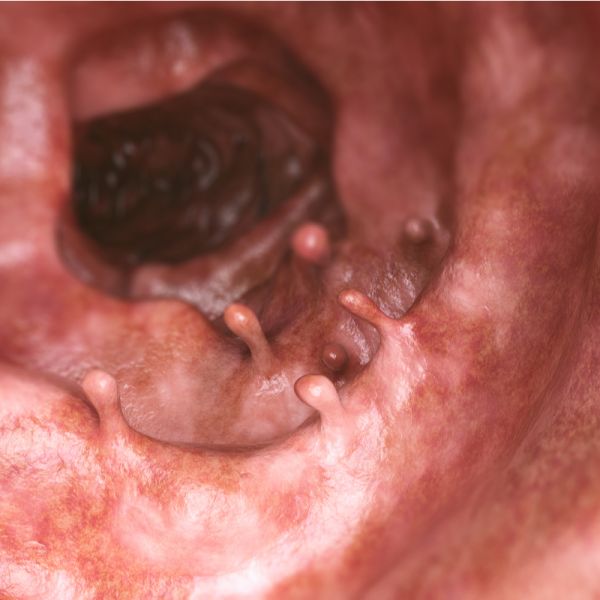
What are intestinal polyps?
Intestinal polyps are protrusions of the intestinal mucosa that are either triggered by certain diseases or form without an identifiable cause. In most cases, intestinal polyps remain asymptomatic and are discovered during a colonoscopy. About one third of people over 60 develop intestinal polyps. Bowel polyps are usually removed surgically (polypectomy) as a precaution because they can develop into bowel cancer.
How do bowel polyps develop and what forms can they take?
Intestinal polyps often form in the large intestine and/or in the rectum. In 70 percent of all cases, they consist of a type of tissue such as the glandular tissue of the intestinal mucosa and form the so-called adenomas. An adenoma is a benign cell structure that can, however, degenerate into cancer. Polyps can generally have a flat shape on the intestinal mucosa, be connected to the intestinal mucosa by means of a stalk or have a shaggy appearance. Doctors also distinguish between individual polyps or the presence of numerous colon polyps (polyposis).
What are the different types of colon polyps?
Doctors distinguish between the following forms of intestinal polyps:
- neoplastic intestinal polyps: This includes, for example, an adenoma that forms in the intestine without any recognisable cause.
- non-neoplastic intestinal polyps: This form of intestinal polyps is caused by inflammation, for example. Non-neoplastic intestinal polyps include, for example, hamartomatous polyps, which arise from scattered germ cells and are usually congenital.
- Lipomas: arise from fat tissue cells.
How can intestinal polyps be prevented?
Since intestinal polyps are more common in Western countries than in Asian regions, for example, doctors suspect that the Western lifestyle contributes to the development of intestinal polyps. This includes foods that are too fatty and high in sugar, as well as increased alcohol and nicotine consumption. In addition, lack of exercise and genetic factors, such as a rather rare familial adenomatous polyposis (FAP), can also contribute.
What symptoms do intestinal polyps cause?
In most cases, intestinal polyps do not cause any symptoms. However, if there is a so-called polyposis, i.e. if there are many polyps in the intestine, the patient may suffer from diarrhoea and abdominal cramps. Since intestinal polyps can occasionally bleed, the patient may also notice a reddish discolouration in the stool. In most cases, however, the blood is not visible to the naked eye and can only be detected by so-called immunological stool tests (iFOBT). It is also possible for intestinal polyps to trigger symptoms of anaemia, which include a feeling of dizziness or weakness.
How are bowel polyps diagnosed?
Bowel polyps are usually diagnosed by chance, for example through a colonoscopy. Especially at an advanced age, a colonoscopy should therefore be done regularly, because intestinal polyps usually do not cause any discomfort, but increase the risk of intestinal cancer. In some cases, intestinal polyps in the rectum can already be visualised by an ultrasound scan or even palpated by means of a digital rectal examination (DRU).
How are bowel polyps treated?
Intestinal polyps can degenerate into cancer, which is why the doctor will remove the polyps through a colonoscopy (polypectomy) as a precaution. The exact procedure depends on the size of the intestinal polyps. If the polyp is less than five millimetres in size, it can usually be removed with biopsy forceps. Larger intestinal polyps, on the other hand, can be removed with an electric snare, as long as they are not directly attached to the mucous membrane. In this case, a colonoscopy with a small surgical procedure is necessary (transanal endoscopic microsurgery, TEM).
| Pathogen | Source | Members - Area |
|---|---|---|
| Polyps of the colon | CAFL | As a NLS member you have direct access to the frequency lists |
| Polyps of the colon | EDTFL | As a NLS member you have direct access to the frequency lists |
| Intestinal Polyps | KHZ | As NLS member you have direct access to the frequency lists |
